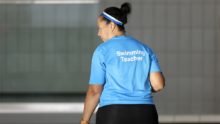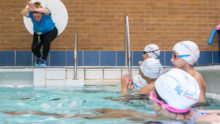
Building confidence in young swimmers
January 10, 2016 Careers AdviceBuilding confidence in young swimmers is a vital part of being a swimming teacher. Often, however, children can slip through the net and become fearful of the water.
These children quickly lose water confidence and eventually start to make excuses about attending swimming classes. Before you know it, the child sees the water as the enemy and not something to enjoy.
Building confidence: listen and observe
One way to help build confidence in children is to listen and not bombard them with knowledge without checking they understand.
Some children don’t like to ask questions, particularly when they are not feeling confident. If the child has not understood what the teacher is asking, they’ll follow the other children, thinking they are practicing the exercise that’s been asked of them.
The reality is that the child is bluffing. This often leads to learning bad habits and a feeling of insecurity. Before you know it, a problem has been created.
For example, a child who has not learned and understood the fundamentals of their breathing pattern above and under the water, or does not know how to float, will never be able to enjoy the water confidently.
Only when water-confidence skills have been taught and the child is comfortable can swimming strokes be introduced. Jumping too soon to strokes can lead to dented confidence.
Building confidence: nurturing and patience
With nurturing, patience and understanding from the teacher, a child can learn not only to enjoy the water but to be happy and safe.
Before the child becomes an adult, we need to change our perspective and make it our job to encourage children and support the individuals. All swimming teachers want to make a difference to pupils’ lives.
If we are to inspire others we must apply our knowledge and expertise and remain open so we are able to learn from other teachers and our pupils.
So ensure your children aren’t bluffing. Look out for those who need confidence building and recommend smaller lessons if needed. If we don’t we are only building up problems for the child’s future.
 Careers in Aquatics
Careers in Aquatics



